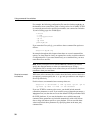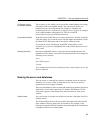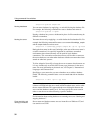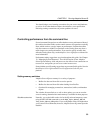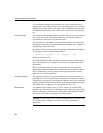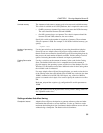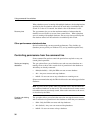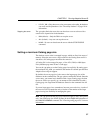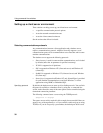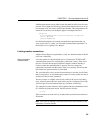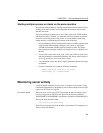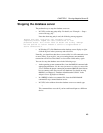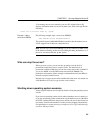
Using command-line switches
38
Setting up a client/server environment
Three switches can help you set up your client/server environment.
•
-x specifies communication protocol options.
•
-tl sets the network connection timeout.
•
-ti sets the client connection timeout.
See the sections that follow for details.
Selecting communications protocols
Any communications between a client application and a database server
require a communications protocol. Adaptive Server IQ supports a set of
communications protocols for communications across networks and for same-
machine communications.
The database server supports the following protocols:
• Shared memory is used for same-machine communications, and is loaded
by default (unless the
-hs parameter is specified on startup).
• TCP/IP is supported on all platforms.
• IPX is supported on Windows NT (client and server) and Windows 95
(client only).
• NetBIOS is supported on Windows NT (client and server) and Windows
95 (client only).
• Named pipes is supported on Windows NT only. Named Pipes is provided
for same machine communications to and from Windows 3.x client
applications using ODBC or Embedded SQL.
Specifying protocols
By default, the database server starts up all available protocols. You can limit
the protocols available to a database server by using the
–x command-line
switch. At the client side, many of the same options can be controlled using the
CommLinks connection parameter.
The following command starts a server using the TCP/IP protocol:
asiqsrv12 -x "tcpip"
The quotes are not strictly required in this example, but are needed if there are
spaces in any of the arguments to
–x. If you omit this switch and you are using
TCP/IP, or if you do not specify a port number, the default port 2638 is used.



